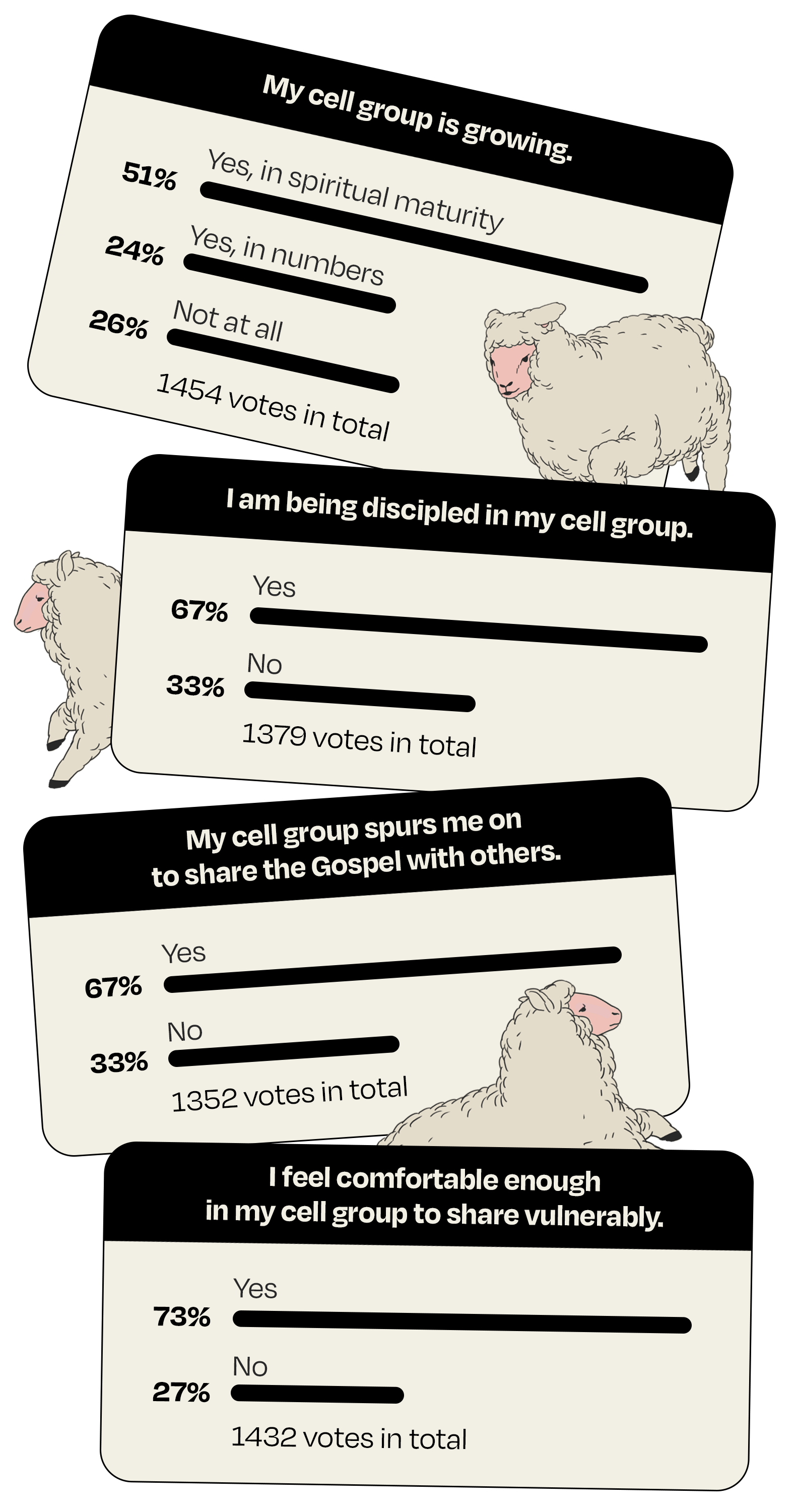Cell group, small group, life group, discipleship group…
Whatever your church calls it, you would probably already be asked to join a community of believers outside of your weekly worship service.
With Singapore no longer having any restrictions on group size, it’s a chance for many cell groups (or CGs — the term we’re using for this article) to finally meet in full force and make plans for the future.
Thir.st recently ran a series of stories to encourage people to take stock of how their CGs have been doing.
Here’s a snapshot of key findings after our Telegram poll (Apr 24) ran for two weeks.

While the results were largely positive, there were a few points of concern, especially with the roughly 400 people who said their CGs were lacking in these areas: growth, discipleship, outreach and being a safe place to share struggles.
That said, it’s worth going back to the big-picture question of why CGs exist. Let’s hear what these church leaders had to say!
- Rev Dr Chua Chung Kai, Associate Pastor, Covenant Evangelical Free Church
- Pr Wendy Chiang, Senior Pastoral Staff (Cells, Discipleship & Nurture, Girls’ Brigade), Aldersgate Methodist Church
- Ps Rick Toh, Lead Pastor, Yio Chu Kang Chapel
- Ps Amadea Seow, Next Gen Pastor, Maranatha Christian Assembly
1. What does a healthy cell group look like?
Ps Chung Kai: A healthy CG is a safe place where members encourage each other to love the Lord and each other, and to serve Him “more and more” (1 Thessalonians 4:1).
There is both the expression of the mandate (The Great Commandment – to love God and one another) as well as the mission (The Great Commission – to disciple the nations).
Over-focus on either makes the community less healthy than it can be.
For example, if the CG only focuses on outreach all the time, then it may well compromise on the deepening of relationships. Likewise, if all the community does is to build relationships, then it’s no different from any social group.
We’re redeemed for relationship and purpose.

The solution may not so much be in balancing these out, but understanding:
- The stage of relational growth of the group.
- The rhythm in nurturing both the mandate and mission.
- That these are not mutually exclusive. Loving people is the mission; likewise in doing the mission together, we grow to know and hopefully love each other deeper.
In most of these healthy CGs, there is deepening love for each other and a clearer sense of mission.
Pr Wendy: A healthy CG is not personality-driven nor dependent on the cell leader. It consists of individuals who are invested and intentional in spiritual health, spiritual growth and spiritual friendships.
Health happens when members of the group commit to a routine to meet as well as a plan for growth, with each person contributing his or her part.
Ps Amadea: A healthy CG is intimate and inclusive, where young people can talk about life and grow together spiritually.

Ps Rick: Perhaps we can take a peep at the early Church to help us know what a healthy CG may look like. In Acts 2:42-47 we see the following:
- Word & Discipleship
They’re not just listening to the Word, but also actively re-aligning their lives in accordance to the Word. The essence of their fellowship is to help one another do the same.
- Community & Service
They do not just gather for a weekend religious activity. Their lives are intertwined. They share their possessions with each other and give sacrificially to meet one another’s needs.
- Worship & Testimony
They’re constantly reporting and listening to the works of God. Their hearts are always thankful and worship God with praises.
- Hospitality & Outreach
They open their homes to host meal fellowships. They find favour with the community around them as they are engaged in good works. They proclaim Christ to their neighbours, and welcome seekers and new converts into their midst.
2. What if I’m leading a cell group that’s not growing?
Ps Chung Kai: I deeply appreciate anyone who serves as a small group leader. Growing a community is complex and not easy.
We need to define what “not growing” means. No new people are added? Relationships are stuck on the superficial level? Folks do not want to meet? Or all of the above? Each one has to be addressed differently.
What do people need? Basically, to feel we belong (mandate) and to have a sense of purpose (mission). The Gospel makes both of these possible, but the complexity comes in with choice and group mix.
Some folks may not want to belong nor choose the Lord’s purpose. In any case, I do believe there’s a place for disbanding CGs if the relationships are not working out, or if the group has lost their missional focus.
A CG should only be terminated when recommended actions have failed to launch it back to health.
Pr Wendy: There are many reasons for stagnation. The issue is never with a lack of study curriculum, but the way a CG does life together.
I’ve encountered CGs that struggle with unclear group expectations, changes in life stage, a lack of a safe environment to share faith-life struggles and even complacency due to familiarity.
The wise thing to do is to prayerfully discern the root issue(s), create a face-to-face conversation with members regarding the slide and seek resolutions together. A CG should only be terminated when recommended actions have failed to launch it back to health.
Disbanding should be the last option. Without assessment, disbanding could lead members to feel that they are abandoned or dropped. This could affect their motivation to join subsequent small groups.

Ps Amadea: There is no perfect CG. However, it’s good to evaluate reasons why it’s not growing so that we can be good stewards of the members that God has placed in our cell.
There are many factors to consider such as:
Safe place:
- Is your CG a safe place to share about life?
- Is your CG inviting and providing opportunities for pre-believers to join? Is your CG encouraging?
Dynamic:
- Is your CG vibrant? e.g. having fun, doing life together, hanging out apart from church meetings
- Is your group the right size and the right age range?
- Is the Word taught helping them to build knowledge and apply it at their life stage?
Pastoral/personal care:
- Do you check in with your members or do follow-ups?
- Are you serving out of the overflow or jadedness?
It’s important to talk to your pastor to discuss how your CG could improve.
There are also other ways to run a small group efficiently if manpower is being stretched thinly. You might want to consider combining CGs or reshuffling so that you’re not burnt out.

Ps Rick: Every CG should start with the desire to grow both in spiritual maturity and in numbers.
I would like to suggest that a leader can observe the following:
- Start right
Present clearly the aims and values that the group will be adopting. Every new member needs to be properly briefed too.
Aims: What is the purpose of the CG? What is your vision for this CG? What do you hope the CG will achieve? What do you hope the CG will help the members in?
Values: These are usually about attendance and accountability, everybody playing a part, authenticity in sharing, fellowship around the Word, etc.
- Time frame
A good time frame for the group to exist in its current form would be 1.5 to 2 years.
At the end of the cycle, the CG may agree to multiply by dividing into two, continue for another cycle before multiplying as time is still needed to develop new leaders in their midst, or to disband and encourage members to join other groups in order to connect with other members.
A time frame allows the group to be purposeful, seeking to achieve the goals set by the end of the cycle.
Members who are struggling to fit into the group have a chance to move on charitably. It will also help a dysfunctional group to disband, and protects both the cell leader and the members from emotional burnout.

- Periodical reviews
These remind everyone of the purpose and values of the group, allow for an honest dialogue, and for members to take ownership and consider how they can work together to live these out.
- Multiply leaders
Outside of regular meetings, take time to disciple a select few. The desire is that these will soon rise to become CG leaders as well.
3. Can I look for another cell, take a break or seek a community outside church if I’m not discipled or don’t feel comfortable?
Pr Wendy: Yes, it’s okay. But before you exit, do allow me to address these two common reasons for departure.
Firstly, clarify your idea of “discipleship”.
Many are used to linking discipleship with studying a curriculum in the group, so study and discussion takes priority in the cell meeting.
Using a curriculum is one form of “discipleship”, but it should not be the only form.
This idea to exegete and dive deep into a text may originate from a place of fear: If we don’t do a formal study curriculum, then we won’t develop faith.
I would like to challenge that misconception. Discipleship is not synonymous with Bible study curriculum.
Jesus makes disciples by challenging people to surrender their lives to him on a daily basis.
Imagine: If you and your cell members live surrendered lives by reading the Bible, praying, serving and obeying Christ daily, you wouldn’t need to depend on a Friday to plough through a set of questions in order to be discipled.

There are different ways to disciple one another in a CG. Using a curriculum is one form of “discipleship”, but it should not be the only form.
How about actively listening, discerning and exhorting one another? Interceding for one another? Embarking on an outreach assignment together?
A CG invested in discipleship is vastly different from a CG going through a selected curriculum. The former values obedience to the Master and life transformation. The latter seeks cognitive development, which may or may not result in daily application.
It’s important to be comfortable with your discomfort if you want to learn and grow.
Secondly, would you believe it if I tell you that I’m not always comfortable in my CG too?
It’s largely attributed to my personality, and the unique way that I process and articulate truth in my group. There are days that I feel like an odd ball in my group.
Instead of exiting the group, I have learnt to ask myself:
- What makes me uncomfortable?
- What can Christ teach me through this discomfort?
- What can I learn?
If you’re serious about discipleship, then it’s important to be comfortable with your discomfort if you want to learn and grow. Choose to let God stretch your limits.
Remember, spiritual transformation can never occur in the comfort zone.
Ps Rick: It’s not wrong when one decides to join another cell. The question is why, how and when.
- Why: It’s important that a member’s reasons are sound and proper.
- How: Nobody should leave abruptly without first being accountable at least to the leader. When a member leaves, it should not lead to confusion or division in the group.
- When: This helps one to consider if he/she has taken enough time and steps to process through his/her issues with the group. This involves prayer, seeking counsel and having constructive dialogue with the leader.
Taking a break to focus on work or family obligations may not be the best approach. When life gets busier, we need fellow believers to keep us in prayer and to keep us accountable lest we grow cold and stray from God’s presence.
We’re redeemed to become part of God’s spiritual family, so it’s unbiblical to break away from these spiritual ties that are bestowed on us in Christ.

Seeking another community outside church?
The problem is that these communities are not the local church. They exist to support the believers on a particular aspect of Christian living (e.g. Bible study, spiritual formation, evangelism), but they cannot replace the local church.
The New Testament assumes all believers to be part of a local assembly. The letters of Paul consist of instructions on how believers ought to serve and love one another in the context of a local assembly.
Members should therefore be participating in the community life of their own local churches.
Remember that your leaders are growing too.
Ps Amadea: Take time to think of what you’re looking for in your CG. Talk to your leader or pastor about it.
There will be moments where you feel that you’re not discipled enough on the Word or don’t feel connected with your group. Looking for another CG would be the last solution because there will always be moments that you might not like in a CG.
Remember that your leaders are growing too. Pray for them as they lead you.
Ps Chung Kai: God has designed for us to grow best in safe accountable relationships. There might be seasons where you do not feel ministered by your community. It would be good to have an honest conversation with your leader.
There is a place to have safe accountable relationships beyond one’s church. But one should also have these within one’s church.
Some of you also asked: Is it really necessary to have a cell group? Read on to hear how these pastors responded to that question in this 1800-ASK-PASTOR article!
- When was the last time your cell group evaluated how you’ve been doing as a community?
- What stage of growth is your cell group currently in?
- If you’ve not been struggling with certain aspects of your cell group, what are some practical steps you can take towards addressing these issues?









